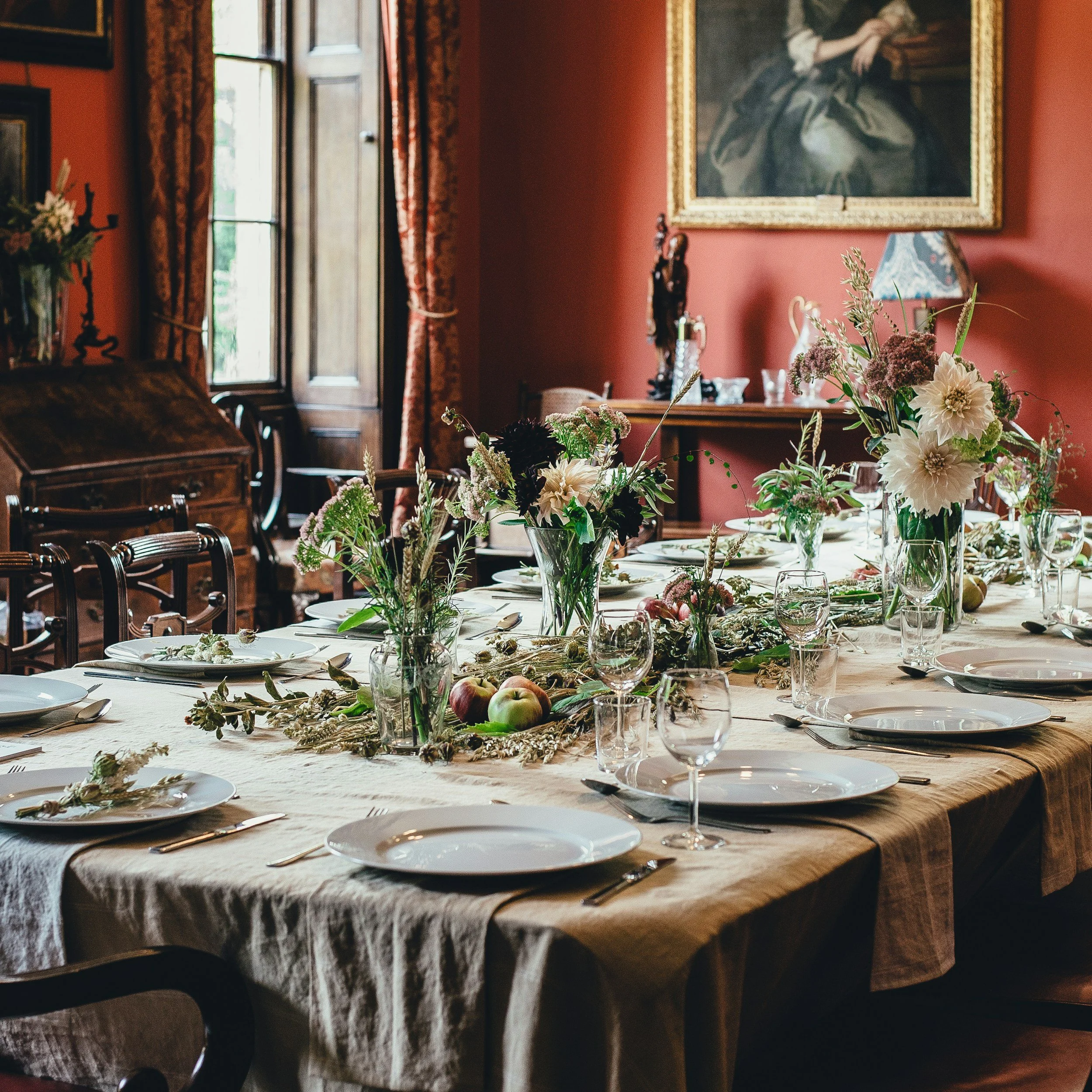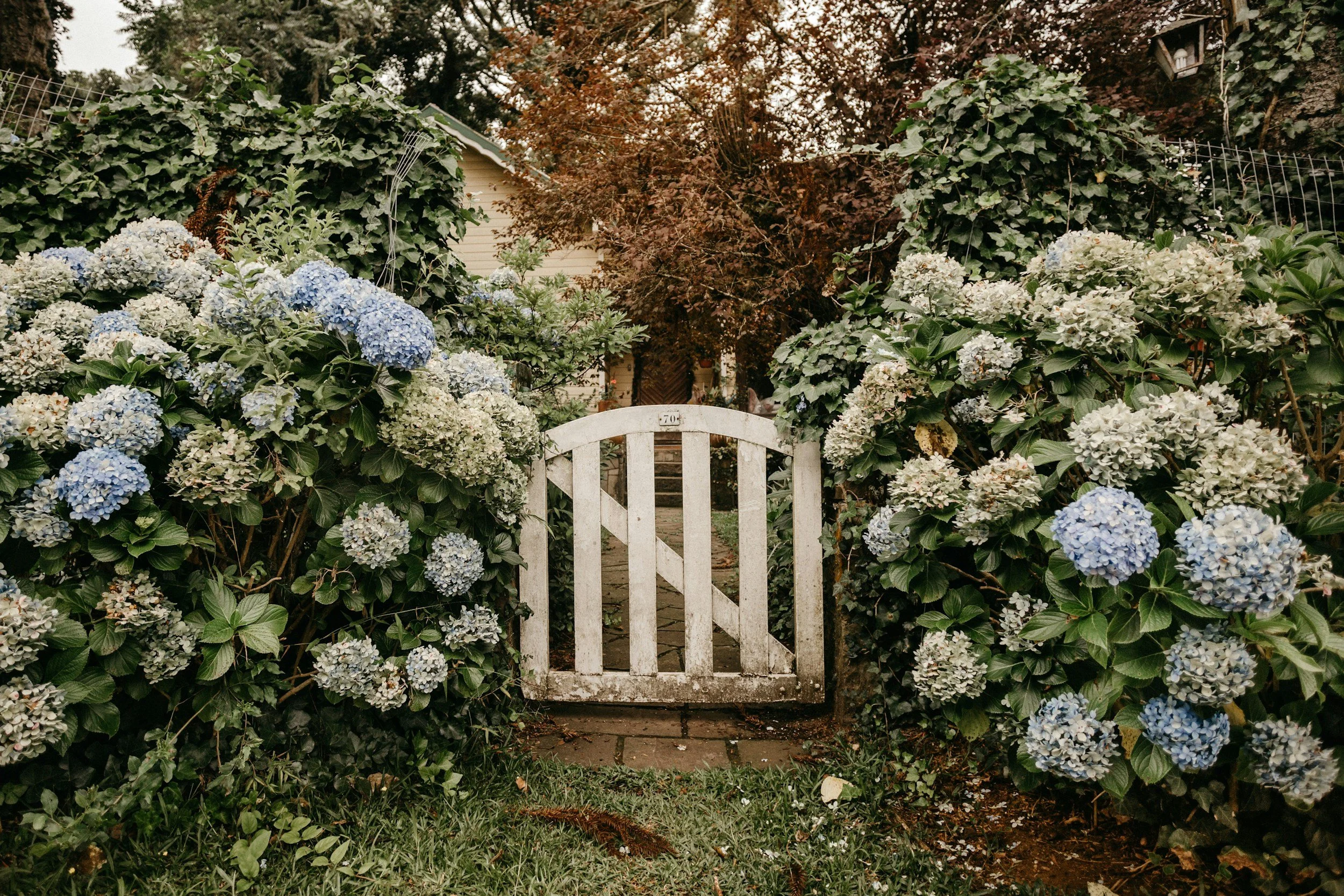Elegy for a Waltz (#12)
Mid-August, 1912
It was the kind of evening designed to dazzle. The air hung thick with warmth, the sky having settled into that bruised shade of blue which comes just before night properly falls. I remember the scent of honeysuckle and citrus as we stepped from the carriage. Sweet and bitter, perfectly matched. Somewhere, a lemon verbena shrub had begun to bloom, its clean tang catching faintly at the back of my throat. A quartet played just beyond the hedged archway, their notes low and insistent, as though they tuned something more vital than strings. The music was not for the ears but for the chest.
The ballroom had been conjured upon the lawn, laid out in measured elegance beside the west-facing terrace. Chandeliers hung from white-bowed poles, flickering like suspended stars. Lanterns tucked into trellised vines cast golden rings upon the gravel. Women drifted like candle flames, their silks and gauze fluttering with each step, their laughter rising in well-timed bursts. The gentlemen formed their customary clusters, evening coats neat, gestures practiced, like chess pieces poised between moves. It was beautiful. It was unbearable.
I arrived with Lord Bergamot. Or rather, I arrived behind him.
He moved with purpose, his coat swinging as he made for the center of things. As if he was drawn in by the murmur of consequential talk. I kept my place a step behind, a shadow clad in plum and grey lace.
That was when I saw him.
Mr. Everett stood by the refreshment table, conversing with Lord Bevington and one of the Ashby sons. His posture was composed and attentive, that familiar stillness he adopted when listening fully. Though he faced away, I knew he had seen me. He always does.
I felt the familiar tightening in my chest. Not panic. Something quieter: recognition, closeness, dread.
And so, without thought, I turned to Lord Bergamot.
“Would you dance the first with me?” I asked, my voice even, perhaps too cheerful.
He blinked. “Dance?”
“Yes,” I said. “It has been some time.”
He looked amused, almost fond. “You are in a rare mood tonight. Must be the heat. Or the moon.”
He adjusted his cufflink, glancing elsewhere.
“Or is it something else?” he said, lowering his voice. “Trying to recapture my youth, are we?”
Before I could respond, a voice called out.
“Bergamot! Cards and cigars in the den. Ellis and Hardwick have begun without us.”
A gentleman I knew only slightly offered a greeting. Lord Bergamot lit up, the prospect of male company clearly more appealing.
“Splendid,” he said. “Exactly the reprieve I require.”
“Just one dance,” I murmured. “The first. A quick turn around the floor.”
He paused, not out of fondness but habit, and then sighed. “Lillian, let us not be absurd. There are others better suited for the floor tonight.”
“Please?”
He glanced between the man and me, exasperated. “We are not newly married. Let’s not play at theatrics.”
Then to the gentleman, “One moment. The lady is indulging a sentiment.”
The man gave a dry chuckle and walked away.
Lord Bergamot turned to me again, voice low, and stern. “Your sudden appetite for appearances is charming. But, let’s not turn it into a scene.”
And with that, he left.
I turned my face to the side, wounded, steadying my breath. That was when I knew Mr. Everett had heard it all.
He had stepped closer, watching.
Lady Ameline stood not far off. She met my gaze without alarm, only that quiet, terrible knowledge.
I do not know what compelled me to remain. Pride, or inertia, perhaps. My gloves felt tighter than they had, my breath unruly. Then Lady Ameline approached, quiet as silk over marble, and touched my arm.
“Walk with me,” she said softly, taking my arm. It was not a request.
We passed behind the clusters of guests toward the edge of the garden, where lanterns dimmed and the air cooled. She allowed me to gather myself. Only when I had drawn a full breath did she nod her approval and return to the gathering.
I remained, though, circling the fringe of the assembly. Far enough to feel unseen, not so far as to be forgotten. The lights here cast long shadows on the gravel. I stood with my back part-turned to the crowd, listening to the low clink of glasses, the whisper of satin, the dull murmur of belligerent laughter trailing from the den.
He found me there, in the shadows.
“Lady Bergamot,” he said. Not Lillian. Never in public.
I did not turn immediately.
“You should not have come,” I said at last, though I could not bring myself to sound reproachful.
“I was invited.”
“You know that is not what I speak of.”
There was a pause, the kind that widens rather than closes distance.
“I saw your husband speak to you,” he said.
I laughed, softly. “Speak is generous. He dictated, as he always does.”
His voice was quiet when it came again. “I would not have spoken to you that way. Not then. Not ever.”
I turned my face slightly, not toward him, but toward the cool space beyond us.
“And yet you did not stop him.”
“I could not,” he replied, a hint of frustration folded beneath his restraint.
“You say that,” I whispered, “as though it should comfort me. As though your inability is less painful than your silence.”
He stepped forward then, just slightly. I could sense it rather than see it.
“You do not know what it costs me,” he said, low and firm.
I looked at him. I let him see the weariness behind my gaze.
“No,” I said. “I do. I know precisely what it costs. Because I am paying the same price.”
Something in him wavered then. His expression broke open, not with weakness but with something more difficult; grief.
“You mean more to me than any reputation, any restraint. But I do not know how to hold on to you without hurting you.”
“Then perhaps you should let me go.”
“I cannot.”
“But you must.”
His breath caught. And for one moment, it felt like the world leaned toward us. Not to bless, not to interfere, but to listen.
I softened. “You did not hurt me by coming. You hurt me by reminding me of what I cannot have.”
He looked down.
“I never meant for this. I never thought...”
“Neither did I.”
I wanted to reach out then, to place my hand against his coat and feel the heat beneath. But I did not. I could not.
“You should go,” I said. “Before we are noticed.”
He bowed his head, just slightly. Then turned.
I walked away, towards the other side of the floor.
As I drifted further, I slowed near a pair of ladies murmuring beneath a willow. One of them, Lady Kent, I believe, was fanning herself too quickly, which always meant her gossip was sharp.
“Isobel Sterling,” she said. “Sweet as spring custard, and just as nervous. Have you noticed the way she keeps glancing toward Mr. Everett? He’s nodded to her twice already this very evening. Twice.”
The other woman gave a thoughtful hum. “There’s talk he might ask her to dance. She has the look of someone waiting to be chosen.”
Lady Kent gave a quiet scoff. “She’s far too prudish. Blushes before a man even speaks. Clings to propriety like it will save her. But men do not wish to be saved. Not truly. Everett may be reserved, but he’s no saint. He’s not a rake, but he knows what it is to be wanted, and how to return it. And a man like that, he won’t marry a girl just because her stitches are fine. And if he does, she certainly won’t keep him in only her boudoir.”
I paused long enough to be certain they were speaking of the copper-haired girl. And now I had a name to place beside the ache: Isobel Sterling.
Then, I turned away.
I moved without aim until I reached the far edge of the lawn, where the crowd thinned and a quiet sort of forgetting seemed permitted. There stood a wide stone basin on a pedestal. Not an urn, truly, but a planter from some earlier era, overgrown with trailing ivy and overflowing with violets. The petals were beginning to curl in the warm air. Their scent, sharp and sweet, overtook everything.
I stood there. I watched the shimmer of candlelight catch the pale edge of my glove, mesmerized as my memory drifted to a pressed violet in an annotated book, left only for me.
Then the music shifted. A waltz, fuller now, more forward in its rhythm.
I looked back.
He was speaking to Miss Daldridge and to the copper-haired girl. Isobel Sterling. A name spun from silk and syllables, the kind of name that lingers politely in drawing rooms and hearts alike.
And then, he asked her to dance.
She looked stunned, then pleased. She took his hand.
They moved to the floor, and he held her with all the careful grace I once adored, and still longed for. The way he steadied a woman’s hand as though it mattered. The way he tilted his head slightly, listening, even when no words were spoken.
And I… I could not breathe.
Lady Ameline returned to my side, always knowing when I am at my most vulnerable.
“You suffer too quietly,” she said.
I didn’t answer.
“I once thought silence was the higher path,” she continued, her voice low and clear. “The nobler one. But all it does is make you fluent in absence.”
Still, I said nothing.
“You think it will pass,” she sighed. “But it will not. It will settle in you. It will become the rhythm beneath every other rhythm. You will smile, and drink tea, and write letters. And still, it will be there. A name you do not say, echoing in every shadow in every room.”
The music swelled. The dancers turned. I saw the line of his shoulder, the way her copper curls moved with the motion.
“It does not get easier,” she said. “It simply gets further away. And that, in time, feels crueler than the ache.”
She looked at me then, and I saw it. Not pity, but recognition. The shared silence of memory unspoken.
I let my gaze drift past her, back to the dancers.
They turned in their soft, imagined world, lit like figures in a dream I no longer believed in.
And though the glow found them, it never once reached me.
A stir behind me, the scent of sandalwood, the click of polished shoes on stone.
“There you are,” Lord Bergamot said, as if I were something mislaid. “The carriage is waiting. I trust the night has served its purpose.”
I did not answer.
He stood beside me for a moment, silent, unmoved. Then, with a sigh: “You’ll catch cold. Come.”
He extended his arm.
Not gently. Not cruelly. Simply as one fulfills an obligation.
I hesitated. But only for a breath.
Then I placed my hand in the crook of his arm, where it had rested a hundred times before.
And it felt like stepping back into a silence I had almost escaped.
—L.B.
You Might Also Love…
Read all of The Violet Letters here:
Copyright Notice:
© 2025 Lady Bergamot's Library. All rights reserved.
This work is the intellectual property of Lady Bergamot's Library (Jessica Jones) and may not be reproduced, copied, pasted, or rewritten without prior written permission.
Links to this content may be shared, but the content itself may not be copied, republished, or distributed elsewhere.
All content on this site, including but not limited to text, images, and original works, is protected by copyright law.
































I was in fourth grade when I found A Series of Unfortunate Events. I talked about them on AIM with my best friend, devoured each new hardcover, and felt like someone finally trusted me with something strange and brilliant.